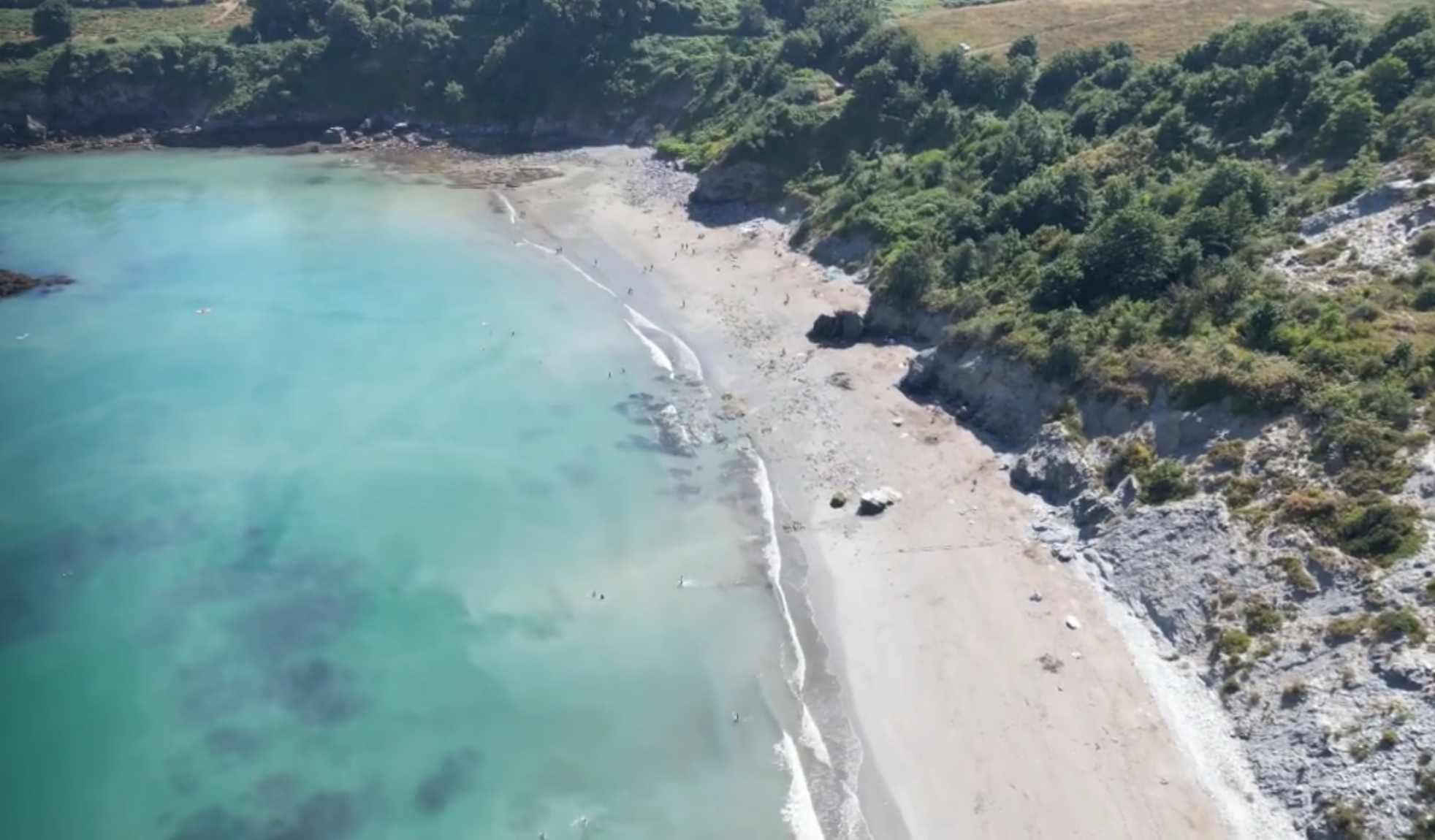Turning the Tide: Ocean Healthcare are dedicated to making a positive impact on our planet.
Recently, we’ve been working on a Carbon Reduction Plan aiming to reach net zero emissions by 2050. As a student pursuing a BA in Environmental Studies, I eagerly took on the challenge of contributing to this plan. With World Ocean Day coming up on June 8th, now is the perfect time to talk about why net zero is crucial and how it relates to our beautiful oceans.
But what is Net Zero exactly?
Net zero is all about balance. It means balancing the greenhouse gases we produce with the amount we remove from the atmosphere. This doesn’t mean we cut all emissions—because that’s impossible. Carbon is everywhere, in rocks, plants, animals, and even in us. Instead, net zero focuses on reducing emissions as much as possible and increasing our efforts to capture and store carbon.
Think of it like a set of scales. On one side, you have the emissions we produce from activities like driving cars, using electricity, and manufacturing goods. On the other side, you have the natural and artificial processes that remove carbon from the atmosphere, like trees, oceans, and carbon capture technology. Net zero is achieved when these scales are balanced.
.png) Trees and Seagrass Matter: Here’s why!
Trees and Seagrass Matter: Here’s why!
One of the most effective ways to reach net zero is by planting more trees. Trees are incredible at absorbing carbon dioxide (CO2) from the air, helping to clean our atmosphere. Our government has recognised this and started many tree-planting projects across the country. But trees aren't the only natural carbon absorbers we rely on.
Seagrass meadows are another fantastic natural tool in our fight against climate change. These underwater plants are incredibly efficient at capturing and storing carbon. In fact, seagrass can store up to 35 times more carbon per hectare than tropical rainforests! Protecting and restoring these vital ecosystems is crucial for supporting the health of our oceans and achieving our net zero goals.
However, not all news about natural carbon sinks is positive. The Amazon Basin, for example, has suffered extensive deforestation. Over the past two years, enough forest was destroyed to release 547.8 gigatonnes of stored carbon. That’s a staggering amount! The primary reason for this deforestation is the global demand for beef and soybeans. Forests are being cleared to create pastures and farmland, which significantly affects our planet’s ability to absorb carbon. Thankfully, international pressure and environmental efforts are helping to slow down this destruction.
Why should we care about reaching net zero?
The answer lies in the harmful effects of greenhouse gas emissions. These emissions are the primary drivers of global warming. As the planet warms, we experience more extreme weather events, rising sea levels, and disruptions to ecosystems. These changes threaten wildlife, like polar bears, and even entire species of plants and animals.
If we don’t act, the damage will become irreversible. Rising temperatures will continue, leading to more severe consequences for the planet. However, by working towards net zero, we can slow down these harmful effects and protect our environment for future generations.
How We Calculate Our Emissions
Creating a Carbon Reduction Plan requires accurate calculations to determine our current emissions and set realistic targets for reduction. Here’s how we did it at Ocean Healthcare:
For our office energy use, the process was straightforward. We used our utility bills to calculate our annual energy consumption in kilowatt-hours (kWh). We then applied a conversion factor (0.2) to find our greenhouse gas emissions. This factor helps us translate our energy use into the equivalent amount of CO2 emissions.
Calculating emissions from travel, such as staff commuting and business trips, was a bit more challenging. We estimated an average of 10 kilometres (about 6.21 mi) per person per day for commuting. We then used a conversion factor (0.18) for fuel emissions to get our figures. This part involved some tricky math, but thankfully, my tutor provided valuable help with the conversion factors, ensuring our calculations were accurate.
Ocean is taking on the challenge & so can you!
At Ocean Healthcare, we’re taking several steps to reduce our carbon footprint and move towards net zero. Here are some of the initiatives we’ve implemented:
Switching to Renewable Energy
We’ve moved our Exeter and Paignton offices to Octopus Energy, a provider of renewable and sustainable energy. By choosing a green energy supplier, we’re significantly reducing our reliance on fossil fuels and cutting our carbon emissions.
Promoting Sustainable Commuting
We’ve introduced a cycle-to-work scheme to encourage our employees to bike to work instead of driving. Cycling not only reduces emissions but also promotes a healthier lifestyle. It’s a win-win for both the environment and our team’s well-being.
Recycling and Reducing Waste
We’re committed to recycling as much as possible and minimising paper use. In our offices, we’ve set up recycling stations and implemented digital solutions to reduce paper waste. These small changes add up to make a big difference.
Supporting Carbon Offsetting Projects
While we work hard to reduce our emissions, we understand that achieving net zero also involves offsetting the emissions we can’t eliminate. We’re exploring partnerships with carbon offsetting projects that focus on reforestation, renewable energy, and other sustainable initiatives.
Over to you: Here’s what you can do
Reaching net zero isn’t just about what companies and governments do. Each of us can make a difference through our daily actions. Here are some simple ways you can help reduce your carbon footprint:
Buy Second-Hand or Donate
Instead of buying new clothes, consider purchasing second-hand items from platforms like Vinted or donating your old clothes to local charities. This reduces waste and the demand for new products, which in turn lowers emissions from production and shipping.
Insulate Your Home
Make sure your home is well-insulated to prevent heat loss. This simple step not only reduces energy consumption but also lowers your heating bills. It’s good for the environment and your wallet!
Choose Sustainable Energy Suppliers
Switch to a sustainable energy supplier that uses renewable sources like wind, solar, or hydro power. This helps reduce your reliance on fossil fuels and cuts your carbon footprint.
Support Local Products
Buying local products reduces the carbon footprint associated with importing goods from far away. Support local farmers and producers whenever possible. Not only does this help the environment, but it also strengthens your local economy.
Recycle, Recycle, Recycle
Recycling is one of the easiest ways to reduce waste and conserve resources. Make sure to recycle everything you can at home and encourage your workplace to do the same. Every little bit helps!
 There are many ways you can get involved with Ocean Projects
There are many ways you can get involved with Ocean Projects
It is World Ocean Day on Saturday (8th June) and the theme this year is Catalyzing Action for Our Ocean & Climate. The World Ocean Day website has plenty of information about the effect of climate change on our oceans. They begin by stating their intention “For 2024, we are launching a new multi-year action theme: Catalyzing Action for Our Ocean & Climate. By growing the movement through transformative collaboration, we aim to create not only a healthy blue planet, but also a more just, equitable and sustainable society.” - Action Theme - World Ocean Day
They have a dedicated page for taking action as well as loads of resources for you to get involved and learn more.

One local initiative is The Cove Discovery Project based in Brixham. You can connect with them on Facebook where they describe what they do, how they do it, the services they provide and their partnerships. More information can be found on their website - The Cove Discovery Project | conservation
“This exciting collaboration of conservation and community creates opportunities for learning and sharing, all focused on ‘The Cove’. We aim to raise awareness of this important wild space for both humans and wildlife. We do this in schools, universities and with members of the public on our beaches and coves. We believe being in nature is key to creating a lasting connection and can help us better understand, learn and appreciate all wildlife, and our relationship with it.
The project is a celebration of a unique haven of beautiful thriving habitats, peaceful beaches and vibrant woodlands. Many thousands of people visit the coast annually. With continued increases in human and wildlife activity, we are looking to promote sustainable balanced ecosystems and celebrate natural beauty for the benefit of all.”
As they say at The Cove Project – INSPIRE | CONNECT | PROTECT
"Individually we are one drop, together we are an Ocean."
Thank you for sticking around! I hope this chat has shown just how crucial reaching net zero emissions is for our planet. Every one of us can help reduce our carbon footprint and work towards a sustainable future. By understanding net zero and taking steps to lower emissions and boost carbon capture, we can make a real difference.
Getting to net zero isn't just about protecting the environment; it's about making sure future generations have a healthy, liveable planet. The actions we take today will shape the health and stability of our world tomorrow. So, let's all pitch in—both individually and as a community—to work towards a net zero future.
